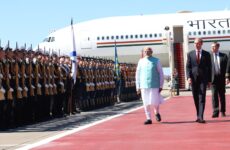New York, The latest issue of the digital magazine “Dabiq” features glossy photos of smiling militants from the Islamic State group, mutilated bodies on the battlefield and articles with titles such as, “There is No Life Without Jihad” and “Foley’s Blood is on Obama’s Hands.”
It refers to Americans as “crusaders” and “apostates.”
And it insists “sincere Muslims” must help speed “the complete collapse of the modern American empire.”
Authorities say the magazine, published in English and other languages and easily available on the Internet — has become a potent propaganda tool for the group to recruit Westerners.
They also warn that the publication, along with other inflammatory messages and videos on Twitter and other social media, have the power to incite so-called “lone wolves” who hatch domestic plots such as the ones officials have alleged recently in Australia and upstate New York.
“That is a current threat — their ability to inspire people here in the United States who can’t travel to Syria to fight, or inspire people to travel to Syria and while they’re there train them and inspire them to come home and commit terrorist acts,” New York Police Department Commissioner William Bratton said recently.
Australian authorities have detained suspects in an alleged plot to carry out random beheadings in Sydney.
Across the globe, Mufid Elfgeeh, of Rochester, New York, pleaded not guilty to charges accusing him of trying to help three recruits get to the Mideast and plotting to kill members of the US armed forces returning from war and Shiites in the Rochester area.
Terror propaganda on the Internet — and law enforcement’s concern about it, isn’t new: Since the Sept. 11, 2001, attacks, the NYPD has assigned foreign-born officers fluent in languages like Arabic and Farsi to surf websites where hatred of the West rages as a way to detect threats.
In 2007, it also released analysis warning that the rants could put young men from the Middle East who had grown disillusioned with life in America on the path to jihad.
But authorities say the rise of the Islamic State group and the proliferation of al-Qaida offshoots has multiplied the anti-American messages found on the Internet, reaching an even broader audience and upping their potential to invite mayhem.
“ISIS and al-Qaida now are competing to see who can do the most,” said Jerome Hauer, commissioner of the New York State Division of Homeland Security, using one of the acronyms for the group. “I think ISIS will become a greater threat as time goes on. … But I don’t see it as an organized attack. I see it as a ‘lone wolf’ attack.”




 Driving Naari Programme launched in Chandigarh
Driving Naari Programme launched in Chandigarh






























